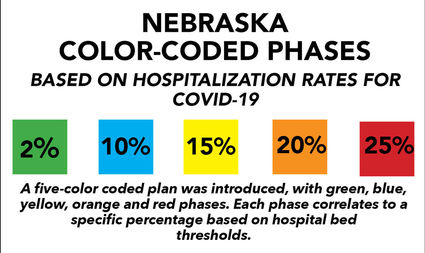As hospitalization rates reach critical levels, Ricketts releases new health restrictions
November 19, 2020
Public health restrictions in the state will take a phased approach, based on the percentage of staffed hospital beds occupied by COVID-19 patients.
The plan, which went into effect Monday, was announced Nov. 13, by Governor Pete Ricketts.
"The cases we have are rising. The virus is in our community and the hospitalizations are rising," Ricketts said,.
On Nov. 12, 905 individuals with the virus filled Nebraska hospital beds.
The number represents approximately 20% of overall hospital beds filled by COVID-19 patients.
Currently, statewide hospital capacity for admitted patients is at 25% and ICU capacity, 27%. Ventilator capacity sits at 70%.
According to the governor, hospital space and ICU bed space remain a concern.
"We've been seeing a rise in hospitalizations, by about 25 patients a day," Ricketts said.
Hospital capacity will serve as the guideline for future restrictions.
With the new plan, restrictions will be tightened once the percentage of coronavirus-related hospitalizations increases beyond an established threshold.
Numbers will be based on the percentage of COVID-19 inpatients, using a 14-day rolling average of staffed beds.
If the percentage of COVID-19 hospitalizations decreases, restrictions will be relaxed.
A five-color coded plan was introduced, with green, blue, yellow, orange and red phases. Each phase correlates to a specific percentage based on hospital bed thresholds.
Currently, Nebraska is in the orange phase, based on current percentages.
If coronavirus-related hospitalizations reach 25%, or approximately 1,170 patients, red-phase restrictions will be implemented.
Those include:
• Youth extracurricular activities prohibited below high school level. Fan attendance will be limited to household members. A six-foot separation will be in effect. Fan attendance for college activities will allow staff and only immediate family members.
• Bars will only be able to offer carryout, delivery and drive-through services.
• Restaurants, if licensed, will be able to offer dine-in service. Masks will be required for public facing restaurant staff. Patrons are required to be seated. Parties will be limited to eight members. Six-foot separation will be in effect. Games will not be allowed. Seating not allowed at the counter or bar. Patrons may have an alcoholic beverage, as long as served with a meal. Dining in will be allowed between 5 a.m. and 9 p.m.
• Church services will be permitted, with six -foot separation between household units. Items may not be passed between different household units.
• Weddings and funerals will have a 10-person limit for receptions. During services, a six-foot separation between households will be required.
• Indoor gatherings will be limited to 10 individuals.
• Outdoor gatherings will observe a 25-person rule.
• Gyms, fitness centers and clubs, health clubs and spas will maintain a six-foot separation between customers.
• Salons, barber shops, massage-therapy and body-art sites will maintain a six-foot separation between customers. Masks will be required.
• Schools will remain open.
• Elective surgeries, including all inpatient Class C, D and E procedures will be postponed.
• Childcare facilities will require all staff, volunteers or practitioners to use masks, or other item sufficient to cover an individual's mouth and nose, when within six feet of children for 15 consecutive minutes or more.
• Public meetings, by executive order, may be held virtually.
Further restrictions may be put in place if hospitalizations move into the red zone.
Ricketts said it is up to all Nebraskans to a part of the solution.
"We need people to get back into good habits we had in the spring," Ricketts said, reminding residents to maintain a six-foot distance from others, wear masks in close spaces, wash hands often, remain home when sick, work from home if possible and shop weekly.
"We also know there is new research out there ... how masks protect both the wearer and everybody else. It cuts down on particles distributed out to the environment. That's why masks are helpful and slow the spread," Ricketts said.




Reader Comments(0)